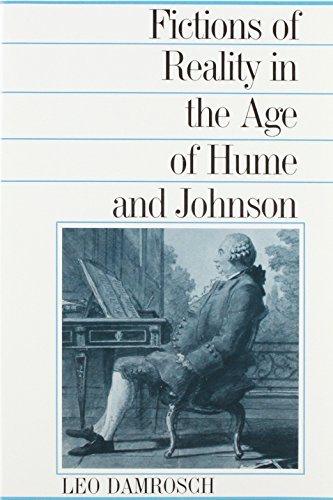Verwandte Artikel zu Fictions of Reality in the Age of Hume and Johnson

Inhaltsangabe
During the second half of the 18th century the most powerful literary work in Britain was nonfictional - philosophy, history, biography, and political controversy, Leo Damrosch argues that this tendency is no accident; at the beginning of the modern age, writers were consciously aware of the role of cultural fictions, and they sought to ground those fictions in a real world beyond the text. Their political conservatism was a considered response to a world in which meaning was inseparable from consensus, and in which consensus was increasingly under attack. Damrosch finds affinities between writers who are usually described as antagonists. The first chapter places Hume and Johnson in dialogue, showing that their responses to the challenge of their age have deep similarities and subsequent chapters explore the interrelationship of the fictional and the ""real"" in a wide range of works by Boswell, Gibbon, White, Burke, and Godwin. Damrosch argues throughout that different temperaments respond differently to the pressures of the age. In its combination of literary, philosophical, and cultural criticism, this book will appeal to scholars in many fields as well as to non-academic readers interested in intellectual history.
Die Inhaltsangabe kann sich auf eine andere Ausgabe dieses Titels beziehen.
Reseña del editor
During the second half of the 18th century the most powerful literary work in Britain was nonfictional - philosophy, history, biography, and political controversy, Leo Damrosch argues that this tendency is no accident; at the beginning of the modern age, writers were consciously aware of the role of cultural fictions, and they sought to ground those fictions in a real world beyond the text. Their political conservatism was a considered response to a world in which meaning was inseparable from consensus, and in which consensus was increasingly under attack. Damrosch finds affinities between writers who are usually described as antagonists. The first chapter places Hume and Johnson in dialogue, showing that their responses to the challenge of their age have deep similarities and subsequent chapters explore the interrelationship of the fictional and the ""real"" in a wide range of works by Boswell, Gibbon, White, Burke, and Godwin. Damrosch argues throughout that different temperaments respond differently to the pressures of the age. In its combination of literary, philosophical, and cultural criticism, this book will appeal to scholars in many fields as well as to non-academic readers interested in intellectual history.
„Über diesen Titel“ kann sich auf eine andere Ausgabe dieses Titels beziehen.
EUR 5,74 für den Versand von Vereinigtes Königreich nach Deutschland
Versandziele, Kosten & DauerSuchergebnisse für Fictions of Reality in the Age of Hume and Johnson
Fictions of Reality in the Age of Hume and Johnson
Anbieter: Better World Books Ltd, Dunfermline, Vereinigtes Königreich
Zustand: Very Good. Ships from the UK. Used book that is in excellent condition. May show signs of wear or have minor defects. Artikel-Nr. 39342038-6
Anzahl: 1 verfügbar
Fictions of Reality in the Age of Hume and Johnson.
Anbieter: Kloof Booksellers & Scientia Verlag, Amsterdam, Niederlande
Zustand: very good. Madison: University of Wisconsin Press, 1989. Paperback. ix. 262 pp. Index. Condition : very good copy. ISBN 9780299123840. Keywords : PHILOSOPHY, Artikel-Nr. 154052
Anzahl: 1 verfügbar
Fictions of Reality in the Age of Hume and Johnson.
Anbieter: Fundus-Online GbR Borkert Schwarz Zerfaß, Berlin, Deutschland
Zustand: Gut. IX., 262 Seiten / p. Aus der Bibliothek von Prof. Wolfgang Haase, langjährigem Herausgeber der ANRW und des International Journal of the Classical Tradition (IJCT) / From the library of Prof. Wolfgang Haase, long-time editor of ANRW and the International Journal of the Classical Tradition (IJCT). - sehr guter Zustand / very good condition - Contents Acknowledgments Note on References Introduction: Texts and Their Realities 1. Johnson and Hume: Fictions of Self and World 2. Boswell: Life as Art 3. Gibbon: Commanding the Past 4. Hume, Gibbon, Johnson: The Fictions of Belief 5. Gilbert White: Enlightenment Science, Conservative Myth 6. Burke: The Breakdown of Consensus 7. Godwin: Resymbolizing the World Works Cited Index. - During the second half of the eighteenth century, the most powerful literary work in Britain was nonfictional: philosophy, history, biography, and political controversy. Leo Damrosch argues that this tendency is no accident; at the beginning of the modern age, writers were consciously aware of the role of cultural fictions, and they sought to ground those fictions in a real world beyond the text. Their political conservatism (often neglected by modern scholars) was a deeply considered response to a world in which meaning was inseparable from consensus, and in which consensus was increasingly under attack. -- Damrosch finds strong affinities between writers who are usually described as antagonists. The first chapter places Hume and Johnson in dialogue, showing that their responses to the challenge of their age have deep similarities, and that their thinking points forward in significant ways to twentieth-century pragmatism. Subsequent chapters explore the interrelationship of the Active and the "real" in a wide range of works by Boswell, Gibbon, White, Burke, and Godwin. Boswell's journals, for instance, dramatize the social construction of reality from a subjective point of view, while Gibbon's Decline and Fall adopts an Olympian perspective and invites its readers to join in a community of irony. -- Damrosch also argues that different temperaments respond differently to the pressures of the age. Thus in contrast with Gibbon's Enlightenment "objectivity," Hume's Dialogues Concerning Natural Religion dramatizes the essential subjectivity of belief. Burke fervently appeals to a consensus which he perceives as on the brink of destruction, while Godwin, who vigorously attacks the same consensus, recognizes how deeply it is rooted in social and psychological needs. -- In its combination of literary, philosophical, and cultural criticism, this book will appeal to scholars in many fields as well as to nonacademic readers interested in intellectual history. ISBN 9780299123840 Sprache: Englisch Gewicht in Gramm: 360 15,9 x 1,9 x 23,5 cm, Broschiert / Paperback. Artikel-Nr. 1175026
Anzahl: 2 verfügbar

